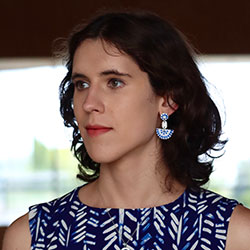CS Senior Spotlight: Eleftheria (Elli) Beres
Continuing her passion for research, Beres will begin a PhD in computer science at the University of Washington this fall
Eleftheria (Elli) Beres didn’t hesitate to contact professors whose work fascinated her. Eager to gain crucial research skills, she jumped into two laboratory positions supported by Summer Undergraduate Research Grants from the Office of Undergraduate Research and a 2023 Northwestern Computer Science Summer Undergraduate Research Fellowship.
 After graduating in June with a bachelor’s degree in computer science from Northwestern Engineering, Beres will continue her passion for research. She plans to pursue a PhD in computer science at the University of Washington, focusing on programming languages, software engineering, and computing education. Her goal is to develop programming systems that empower programmers to easily and efficiently build programs and interact with computing technology.
After graduating in June with a bachelor’s degree in computer science from Northwestern Engineering, Beres will continue her passion for research. She plans to pursue a PhD in computer science at the University of Washington, focusing on programming languages, software engineering, and computing education. Her goal is to develop programming systems that empower programmers to easily and efficiently build programs and interact with computing technology.
In Professor Sam Kriegman’s Xenobot Lab, Beres simulated rigid-body virtual robots that can grow as they interact with their surroundings. Beres developed evolutionary algorithms that model natural selection, providing novel functionality which enables the simulation of robots capable of evolving their own morphologies, behaviors, and growth progressions in a virtual environment.
In Professor Josh Leonard’s Lab for Cellular Devices and Biomolecular Engineering, Beres conceptualized and developed an easy-to-use Python package for synthetic biologists to rapidly analyze batches of flow cytometry data. She presented a poster of this work at the 2023 Engineering Biology Research Consortium’s Annual Meeting.
Recently named among 12 ‘outstanding CS seniors’ for academic excellence and contributions to Northwestern CS, Beres served as a peer mentor for two years. She supported a range of courses, including BME 220-0-20: Introduction to Biomedical Statistics, COMP_SCI 396, 496: Artificial Life, COMP_SCI 349: Machine Learning, DATA_ENG 200-0 Foundations of Data Science, and GEN_ENG 205-1: Engineering Analysis 1.
We asked Beres about her experiences at Northwestern Engineering, opportunities for impactful collaborations, and her advice for current students.
Why did you decide to pursue the CS major at McCormick?
In high school, I competed with my robotics team as the programmer. In that role, I fell in love with programming and computer science. At Northwestern, I found the department to be an incredibly welcoming environment full of passionate, caring, and interesting people.
How did the McCormick curriculum help build a balanced, whole-brain ecosystem around your studies?
The Engineering First classes at Northwestern gave me a strong base of STEM knowledge and engineering experience that I could build from to be successful in my computer science degree. The Design Thinking and Communication course gave me unique practical experience focused on quarter-long team projects for real clients. What's more, by taking Engineering First classes with other engineering students, I gained friends across McCormick that I otherwise wouldn't have met who have stayed with me all throughout my time here.
What are some examples of collaborative or interdisciplinary experiences at Northwestern that were impactful to your education and research?
One of my favorite courses was COMP_SCI 397: Computer Science Education, an interdisciplinary computer science + learning sciences class taught by Professors Mike Horn and Paula Hooper. This course made me more passionate about computing education research — the area I aspire to focus on in my PhD.
I've also had amazing experiences collaborating in the programming languages classes I've taken. In both COMP_SCI 324: Dynamics of Programming Languages and COMP_SCI 396: Programming Languages Seminar, I worked on self-directed projects alongside PhD students in programming languages.
What skills or knowledge did you learn in the undergraduate program that you think will stay with you for a lifetime?
The most important skills I've learned at Northwestern have been soft skills. I've learned how to better collaborate on programming projects with others and how to do research as part of a group. These collaboration skills, in addition to the communication skills I've gained by presenting research and projects to classes, research groups, and conferences, will stay with me for a lifetime.
What's next? What are your short- and long-term plans/goals in terms of graduate studies and/or your career path?
In the fall, I'm starting a PhD in computer science at the University of Washington's Allen School of Computer Science and Engineering, working with Michael Ernst, Amy Ko, and R. Ben Shapiro. After completing the PhD program, I aspire to become a professor to focus on both teaching computer science and researching computing education, programming languages, and software engineering.
What advice do you have for current Northwestern CS students?
Don't be afraid to reach out to professors. My research experiences all started by contacting professors whose work interested me. I've found professors to be more than happy to talk about their work and to help students get involved with projects. I've gotten invaluable research, personal, and professional advice from Northwestern Computer Science professors.
And make sure to take breaks and take care of yourself. The quarter system can be brutal sometimes, and it's easy to get overwhelmed. Don't be afraid to take things at your own pace, do things outside of classes for fun, and reach out for help if you're struggling.
